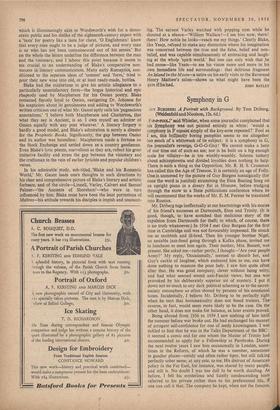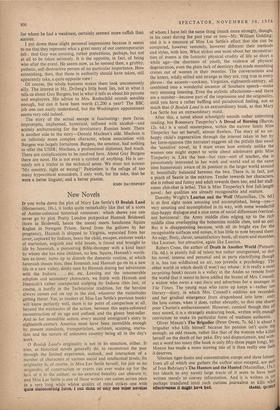Symphony in .G
,uY Bottoms: A Portrait with Background. By Torn Driberg. (Wcidenfeld and Nicolson, 12s. 6d.) F-F-F•FOOLI said Whistler, when some journalist complained that his Symphony was not painted entirely in white: 'would a symphony in F consist simply of the key-note repeated?' Fool as I am, this brilliantly boring pamphlet seems to me altogether too much of a whitewash of its subject: it is a symphony in G, the journalist's revenge, G-G-G-Guy 1 We cannot make a hero of our time out of such an ass; nor is he built on a big enough scale for villainy—he is too wimbly-wambly. Solemn tushery about schizophrenia and divided loyalties does nothing to help. There is such a thing as the Opposition. Mr. R. H. S. Crossman has called this the Age of Treason. It is certainly an age of Folly. One is unmoved by the picture of Guy Burgess nostalgically (for once the word is justified) strumming the Eton Boating Song on an upright piano in a dreary flat in Moscow, before trudging through the snow to a State publications conference where he will recommend that the works of Mr. E. M. Forster be translated into Russian.
Mr. Driberg tugs ineffectually at our heartstrings with his stories of his friend's successes at Dartmouth, Eton and Trinity. (It is good, though, to have scotched that malicious story of the expulsion from Dartmouth for theft; in which, of course, there is no truth whatsoever.) In 1934 I met Guy Burgess for the first time in Cambridge and was not favourably impressed. He struck me as snobbish and ill-bred. Then his younger brother Nigel, an amiable jazz-fiend going through a Kafka phase, invited me to luncheon to meet him again. Their mother, Mrs. Bassett, was present. She asked me—rather pertly, I thought—'Are your people Army?' My reply, 'Occasionally,' seemed to disturb her, and Guy's cackle of laughter, which endeared him to me, can have done nothing to reassure the poor lady. I saw him quite often after that. He was good company, clever without being witty, and had what seemed sound anti-Fascist views; but one was provoked by his deliberately superior air of mystery. I put it down not so much to any dark political scheming as to the secret- society atmosphere so often shared by persons of his emotional tastes. Incidentally, I believe Mr. Driberg to be perfectly right when he says that homosexuality does not breed traitors. The' reverse, in fact, would seem more likely to be the case. On the other hand, it does not make for balance, as later events proved.
Being abroad from 1936 to 1939 I saw nothing of him until the summer before war broke out. He had exchanged his manner of arrogant self-confidence for one of seedy knowingness. I was tickled to find that he was in the Talks Department of the BBC: it seemed a comic end for one whom the Master of Trinity had recommended to apply for a Fellowship at Pembroke. During the next twelve years I saw him occasionally in London, some- times in the Reform, of which he was a member, sometimes in gaudier places—untidy and often rather tipsy, but still talking perfectly sober sense; at any rate, to me. His distrust of American policy in the Far East, for instance, was shared by many people, and still is. No doubt I was too dull to be worth dazzling. As before, I felt his mysterious and faintly condescending hints referred to his private rather than to his professional life, if one can call it that. The company he kept, when not the famous,
for whom he had a weakness, certainly seemed more raffish than sinister.
I put down these slight personal impressions because it seems to me that they represent what a great many of our contemporaries felt : that Guy was amusing, rather pretentious, perhaps, but not at all to be taken seriously. It is the opposite, in fact, of being wise after the event. He seems now, as he seemed then, a grubby, pathetic, self-destructive person of no particular importance. How astonishing, then, that those in authority should have taken, still apparently take, a quite opposite view !
Of course, the whole business makes them look uncommonly silly. The interest in Mr. Driberg's little book lies, not in what it tells us about Guy Burgess, but in what it tells us about his patrons and employers. His advice to Mrs. Rothschild sounds sensible enough, but can it have been worth £1,200 a year? The BBC job one can easily understand, but the Washington appointment seems very odd indeed.
The story of the actual escape is fascinating: pure farce, impromptu, unplanned, hysterical, suffused with alcohol—and acutely embarrassing for the involuntary Russian hosts. There is another side to the story—Donald Maclean's side. Maclean is an infinitely more complex character, whose association with Burgess was largely fortuitous. Burgess, the amateur, had nothing to offer the USSR; Maclean, a professional diplomat, had much. There are complications to be resolved here. About Guy Burgess there are none. He is not even a symbol of anything. He is cer- tainly not a traitor in the technical sense. We must not scream 'My country, right or wrong!' Patriotism is the refuge of too many hypocritical scoundrels. I only wish, for his sake, that he were a better linguist; and a better pianist.
JOHN DAVENPORT



















































 Previous page
Previous page